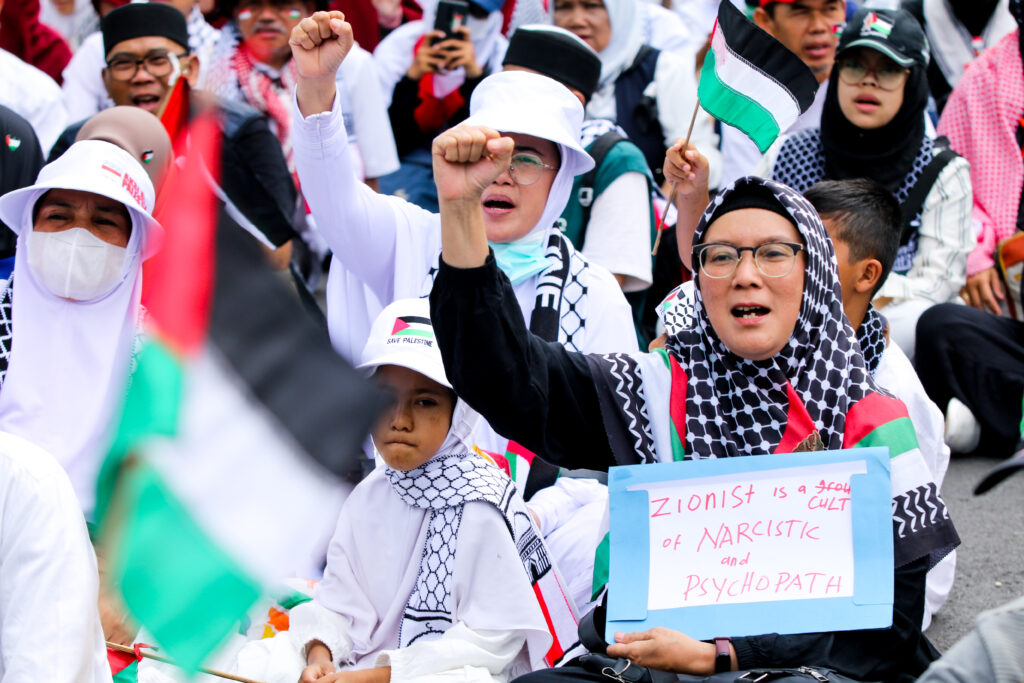Hamas conducted one of their most lethal and impactful operations on 7 October 2023. The attack not only killed over 1200 Israelis and took more than 240 people hostage, but also increased Hamas’ credentials vis-a-vis their rival, the Palestinian National Authority.
So far, the response of Indonesian terrorist organisations has been muted when compared to the period after the Islamic State’s (IS) June 2014 declaration of a caliphate across IS-held territories in Syria and Iraq.
After IS’ declaration, numerous Indonesian jihadist groups immediately proclaimed support and changed strategic priorities to attack IS-approved targets. The East Indonesia Mujahideen and Abu Bakar Bashir, Jemaah Islamiyah’s (JI) leader, publicly pledged loyalty to IS within a month. Within a year, 18 Indonesian terrorist organisations had declared support for IS and many set up procedures to facilitate members to travel and fight in Syria.
Indonesia’s Al Qaeda sympathisers are largely supportive of Hamas and echoed Al Qaeda’s call for Muslims to aid the fight against Israel. Pro-IS communities, by contrast, have tempered well wishes for Palestinians’ victory over Israel on online platforms like Facebook, with criticism of Hamas’ failure to apply Sharia Law in Gaza and desire to establish a nation-state instead of an Islamic caliphate.
None of Indonesia’s major terrorist organisations have formally declared support for Hamas or diverted resources to aid them. An exception is Bashir, who called for youths to support those in Palestine during a pro-Palestinian demonstration in Surakarta, Central Java. But despite his standing as an elder statesman, Bashir’s influence among groups is now ambivalent at best and unlikely to change operational priorities.
Indonesian terrorist organisations’ relatively sanguine response to Hamas’ actions in 2023 as compared to IS’ actions in 2014 owes to two factors. First, it is not feasible for these organisations to carry out major operations in support of Hamas. Since 2019, both JI and Jamaah Ansharut Daulah (JAD) have suffered major setbacks due to extensive arrests by Indonesia’s special counter-terrorism unit, Special Detachment 88. A total of 376 JI and 337 JAD members, including key organisational figures responsible for leadership, finance and operations, have been arrested.
Consequently, Indonesian terrorist organisations either cannot coordinate resources towards operations or are focussing their resources on ensuring survival. JAD has experienced decentralisation to the extent that cells are unable to formulate a unified strategy and mobilise resources. Despite an increased number of terrorist plots by JAD in 2023, none were successfully executed. Conversely, JI has been forced to direct its resources towards reconstructing organisational structures, concealing remaining senior members and seeking new leadership.
In 2014, multiple organisations still had the resources needed to coordinate support for IS. Groups like the Forum of Islamic Law Activists still had an operational website which it used to contextualise IS propaganda and enough funds to sponsor multiple IS loyalty pledge ceremonies across Indonesia. There were also Indonesians in Syria who helped cultivate the growth of Indonesian pro-IS communities by funding local groups and setting up networks to facilitate travel to Syria. Unlike Hamas, IS had a global agenda and created infrastructure, like their Katibah Nusantara unit, to integrate Indonesians who went to aid them.
The second reason why Indonesian terrorist organisations have not supported Hamas is because it does not benefit their current strategic priorities. JAD’s strategic priority is to undermine the government by attacking key state symbols. Arrests in 2023 found that JAD’s most active faction, led by Abu Umar, has primarily focussed on disrupting the upcoming 2024 Indonesian election by planning to attack voting booths and police stations.
For JI, the strategic priority since 2009 has been to generate popular support for the concept of an Islamic caliphate through proselytising and infiltrating Islamic organisations. For this purpose, the group has successfully infiltrated the Indonesian Ulema Council along with many local organisations. Pivoting activities towards public support of Hamas — which does not seek to establish a caliphate — would not only contradict these efforts but would also redirect people’s fervour to support war efforts in Palestine instead of JI’s endeavours in Indonesia.
It was beneficial for groups to support IS when they declared the caliphate in 2014. For JAD jihadists, IS’ call to violence provided much needed strategic justification to conduct armed jihad during a time where major groups were either shifting away from violence or were disbanded for their involvement in violence.
While JI opposed IS, engaging with the Syrian conflict in 2014 was also beneficial for them. Syria’s porous borders and the existence of groups like al-Nusra Front (now Hayat Tahrir al-Sham), who could host foreign fighters, allowed JI to enrol members in much needed military training abroad — an opportunity absent in the current conflict.
Indonesian terrorist organisations may eventually engage with the Hamas–Israel conflict. As of now, Indonesian terrorist organisations are simply too weak and preoccupied to shift their resources to support Hamas. Unless Indonesia’s counter-terrorism operations wane or Palestinian groups become more receptive to training foreign fighters, this situation is unlikely to change.
Alif Satria is an Associate Research Fellow at the International Centre for Political Violence and Terrorism Research (ICPVTR) at the S Rajaratnam School of International Studies (RSIS), Nanyang Technological University (NTU), Singapore.

